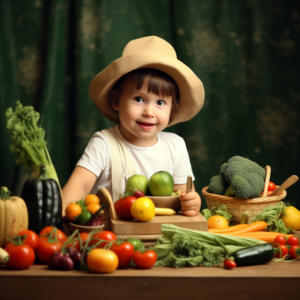Pregnancy is a time of joy and anticipation, and if you’re a vegan mom-to-be, you might have heard various myths and misconceptions about maintaining a vegan diet during pregnancy. In this article, we’ll debunk common myths and provide you with the facts about vegan pregnancy nutrition, ensuring you have the information you need to nourish yourself and your growing baby.
Myth #1: Vegan Diets Lack Essential Nutrients
Fact: Vegan diets can provide all the necessary nutrients for a healthy pregnancy. To meet your nutritional needs, focus on a variety of plant-based foods, including fruits, vegetables, legumes, whole grains, nuts, and seeds. Supplements like vitamin B12 and prenatal vitamins can help fill potential gaps.
Myth #2: Vegan Diets Lead to Low Birth Weight
Fact: A well-balanced vegan diet can support a healthy pregnancy and a normal birth weight for your baby. Ensure you consume sufficient calories, protein, and essential nutrients to support your baby’s growth.
Myth #3: Vegan Diets Don’t Provide Enough Iron
Fact: Plant-based sources of iron, such as dark leafy greens, lentils, and fortified cereals, are abundant in vegan diets. Pairing these foods with vitamin C-rich options like citrus fruits or bell peppers can enhance iron absorption.
Myth #4: Vegans Can’t Get Enough Calcium
Fact: Vegan sources of calcium include fortified plant-based milk, tofu, kale, and almonds. Consuming these foods can help you meet your calcium requirements during pregnancy.
Myth #5: Vegan Diets Cause Nutritional Deficiencies in Babies
Fact: Breast milk or properly formulated vegan infant formulas can provide all the necessary nutrients for your baby’s growth and development. Consult with a healthcare provider or registered dietitian to ensure your baby receives adequate nutrition.
Myth #6: Vegan Diets Lead to Pregnancy Complications
Fact: Well-planned vegan diets have been shown to reduce the risk of certain pregnancy complications, such as gestational diabetes and pre-eclampsia. Focus on balanced nutrition and regular prenatal check-ups to ensure a healthy pregnancy.
Myth #7: You Need to Eat Meat for Protein
Fact: Protein needs during pregnancy can be met through plant-based sources like beans, lentils, tofu, and quinoa. These foods provide essential amino acids required for fetal development.
Myth #8: Vegans Can’t Get Enough Omega-3 Fatty Acids
Fact: Include flaxseeds, chia seeds, walnuts, and hemp seeds in your diet for essential omega-3 fatty acids. These fats are crucial for your baby’s brain and eye development.
Conclusion
Vegan pregnancy can be safe and healthy when approached with knowledge and careful planning. Debunking these myths and understanding the facts about vegan nutrition during pregnancy empowers you to make informed choices that support both your well-being and your baby’s growth. Consult with a healthcare provider or registered dietitian to create a personalized vegan pregnancy nutrition plan that ensures you and your baby receive the best possible care.



